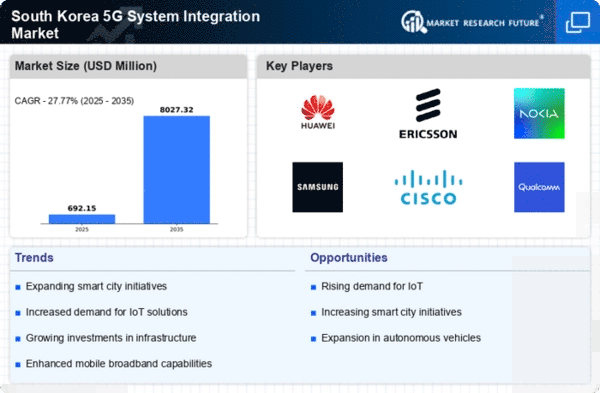Growth of Mobile Edge Computing
Mobile edge computing (MEC) is emerging as a vital driver for the 5G System Integration Market in South Korea. By processing data closer to the end-user, MEC reduces latency and enhances the performance of applications reliant on real-time data. This technology is particularly beneficial for industries such as gaming, augmented reality, and autonomous driving, where instantaneous data processing is critical. The South Korean government has recognized the potential of MEC and is investing in research and development to foster its growth. As a result, the 5g system-integration market is likely to see increased adoption of MEC solutions, which could account for a substantial share of the overall market by 2026.
Expansion of Smart City Initiatives
The development of smart city initiatives in South Korea significantly influences the 5G System Integration Market. Cities are increasingly adopting advanced technologies to enhance urban living, improve public services, and optimize resource management. The integration of 5g technology is crucial for the successful implementation of smart city projects, as it facilitates real-time data collection and analysis. For instance, the South Korean government has allocated approximately $1 billion for smart city projects, which are expected to create a robust demand for 5g system-integration solutions. This investment not only supports infrastructure development but also encourages collaboration between public and private sectors, driving innovation in the 5g system-integration market.
Rising Demand for High-Speed Connectivity
The 5G System Integration Market in South Korea is experiencing a surge in demand for high-speed connectivity. As consumers and businesses increasingly rely on data-intensive applications, the need for faster and more reliable internet services becomes paramount. This demand is reflected in the growing number of 5g subscriptions, which reached approximately 20 million by the end of 2025. The integration of 5g technology into various sectors, including healthcare, automotive, and entertainment, further propels this trend. Enhanced connectivity not only improves user experience but also enables innovative solutions such as remote surgeries and autonomous vehicles. Consequently, the 5g system-integration market is poised for substantial growth as stakeholders seek to capitalize on this demand for high-speed connectivity.
Increased Focus on Cybersecurity Solutions
As the 5G System Integration Market expands in South Korea, the focus on cybersecurity solutions becomes increasingly critical. The proliferation of connected devices and the vast amounts of data transmitted over 5g networks heighten the risk of cyber threats. Consequently, businesses and government entities are prioritizing the implementation of robust cybersecurity measures to protect sensitive information and maintain user trust. The South Korean government has introduced regulations aimed at enhancing cybersecurity frameworks, which in turn drives demand for integrated security solutions within the 5g system-integration market. This emphasis on cybersecurity is likely to shape the market landscape, as stakeholders seek to ensure the integrity and safety of their 5g deployments.
Emergence of Advanced Industrial Applications
The 5G System Integration Market is being propelled by the emergence of advanced industrial applications in South Korea. Industries such as manufacturing, logistics, and agriculture are increasingly leveraging 5g technology to enhance operational efficiency and productivity. For example, the integration of 5g in manufacturing allows for real-time monitoring and automation of production processes, leading to reduced downtime and increased output. The South Korean government has initiated programs to support the adoption of 5g in these sectors, which is expected to drive market growth. As industries continue to explore the potential of 5g, the 5g system-integration market is likely to expand significantly, with an estimated growth rate of 25% annually through 2027.
















